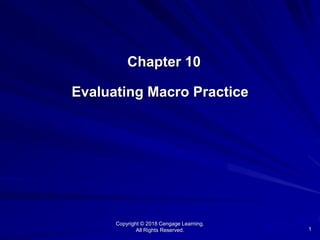
Ppt ch10 gpoc
- 1. 1 Chapter 10 Evaluating Macro Practice Copyright © 2018 Cengage Learning. All Rights Reserved.
- 2. Copyright © 2018 Cengage Learning. All Rights Reserved. 2 Why engage in program evaluation research? • A program must prove it is successful if it expects to receive continued support • Social workers are called upon to use the results of this type of research as a matter of ethical practice
- 3. Copyright © 2018 Cengage Learning. All Rights Reserved. 3 Context of Program Evaluation • Program evaluation efforts have historical roots • All efforts ask the questions: • Do the interventions work? • How do we know they work?
- 4. Copyright © 2018 Cengage Learning. All Rights Reserved. 4 Purposes of Program Evaluation • There are multiple reasons for engaging in program evaluation • Important for workers to be clear on what information is needed prior to engaging in this type of evaluation
- 5. Copyright © 2018 Cengage Learning. All Rights Reserved. 5 Key Concepts in Evaluation (slide 1 of 4) • Control Group • Experimental Group • Dependent Variable • Independent Variable • Sampling • Random Sample
- 6. Copyright © 2018 Cengage Learning. All Rights Reserved. 6 Key Concepts in Evaluation (slide 2 of 4) • Experimental Design • Quasi-Experimental Designs • Baseline • Measures of Central Tendency • Standard Deviation • Reliability
- 7. Copyright © 2018 Cengage Learning. All Rights Reserved. 7 Key Concepts in Evaluation (slide 3 of 4) • Validity • Face validity • Predictive validity • Descriptive Statistics • Inferential Statistics • Outcome
- 8. Copyright © 2018 Cengage Learning. All Rights Reserved. 8 Key Concepts in Evaluation (slide 4 of 4) • Outcome Measures • Practice outcomes • Functional outcomes • Process of care outcomes • Statistical Significance • Chi-Square Test • Correlation Test
- 9. Copyright © 2018 Cengage Learning. All Rights Reserved. 9 Problems and Barriers in Program Evaluation • Failure to Plan for Evaluation • Lack of Program Stability • Relationships between Evaluators and Practitioners • When Evaluation Results Are Unclear • When Evaluation Results Are Not Accepted • When Evaluation Is Not Worth the Effort
- 10. Copyright © 2018 Cengage Learning. All Rights Reserved. 10 Kinds of Evaluations • Formative (or Monitoring) Evaluations • Summative (or Impact) Evaluations • Effectiveness and Efficiency Evaluations
- 11. Copyright © 2018 Cengage Learning. All Rights Reserved. 11 Evaluation Approaches • Quantitative Methods • Qualitative Methods • One-Group Post-Test Designs • Pre-Test/Post-Test Designs • Client Satisfaction Surveys • Goal Attainment Scaling
- 12. Copyright © 2018 Cengage Learning. All Rights Reserved. 12 Evaluation Approaches (continued) • Target Problem Scaling • Case Studies • Group Comparisons • Quality Assurance Reviews
- 13. Copyright © 2018 Cengage Learning. All Rights Reserved. 13 Stages in Evaluation (slide 1 of 4) • Stage 1: Conceptualization and Goal Setting • Stage 2: Measurement • Stage 3: Sampling • Statistical Package for the Social Sciences (SPSS) • Systematic Random Sampling • Stratified Random Sampling
- 14. Copyright © 2018 Cengage Learning. All Rights Reserved. 14 Stages in Evaluation (slide 2 of 4) • Stage 4: Design • Threats to validity • Maturation
- 15. Copyright © 2018 Cengage Learning. All Rights Reserved. 15 Six Common Evaluation Designs • Pre-Experimental Designs • One-Group Post-Test-Only Design • Post-Test-Only Design with Nonequivalent Groups • One-Group Pre-Test/Post-Test Design
- 16. Copyright © 2018 Cengage Learning. All Rights Reserved. 16 Six Common Evaluation Designs (continued) • Quasi-Experimental Designs • Nonequivalent control group designs • Time-series designs • Multiple time-series designs • Experimental Designs • Requires both random assignment of subjects and a control group • Most difficult to use in actual practice
- 17. Copyright © 2018 Cengage Learning. All Rights Reserved. 17 Stages in Evaluation (slide 3 of 4) • Stage 5: Data Gathering • Instruments, tests, scales • Use of existing instruments preferred due to issues of validity and reliability • Stage 6: Data Analysis • Univariate analysis • Bivariate analysis • Multivariate analysis • Regression analysis
- 18. Copyright © 2018 Cengage Learning. All Rights Reserved. 18 Stages in Evaluation (slide 4 of 4) • Stage 7: Data Presentation • Part 1: Introduction • Part 2: Literature Review • Part 3: Methodology • Part 4: Results • Part 5: Discussion • Part 6: References and Appendices • Summary of Data Presentation
- 19. Copyright © 2018 Cengage Learning. All Rights Reserved. 19 Communicating Evaluation Data • Data must be presented in a clear and concise fashion • Written reports should be in a one page, Executive Summary format, highlighting the most significant findings • All six sections listed above should be addressed
- 20. Copyright © 2018 Cengage Learning. All Rights Reserved. 20 Ethics and Values in Evaluation • Subjects used in program evaluations must be volunteers • The volunteering subject must be informed of the potential risks associated with participation • No one should be harmed as a result of volunteering • Privacy of volunteers must be stringently guarded
- 21. Copyright © 2018 Cengage Learning. All Rights Reserved. 21 NASW and the Code of Ethics • Social workers are obliged to stay current with relevant research • Social workers are obliged to contribute to the knowledge base of social work practice • Social workers are obliged to ensure that clients are given the most effective interventions possible • Social workers are obliged to ensure that programs are based on solid research